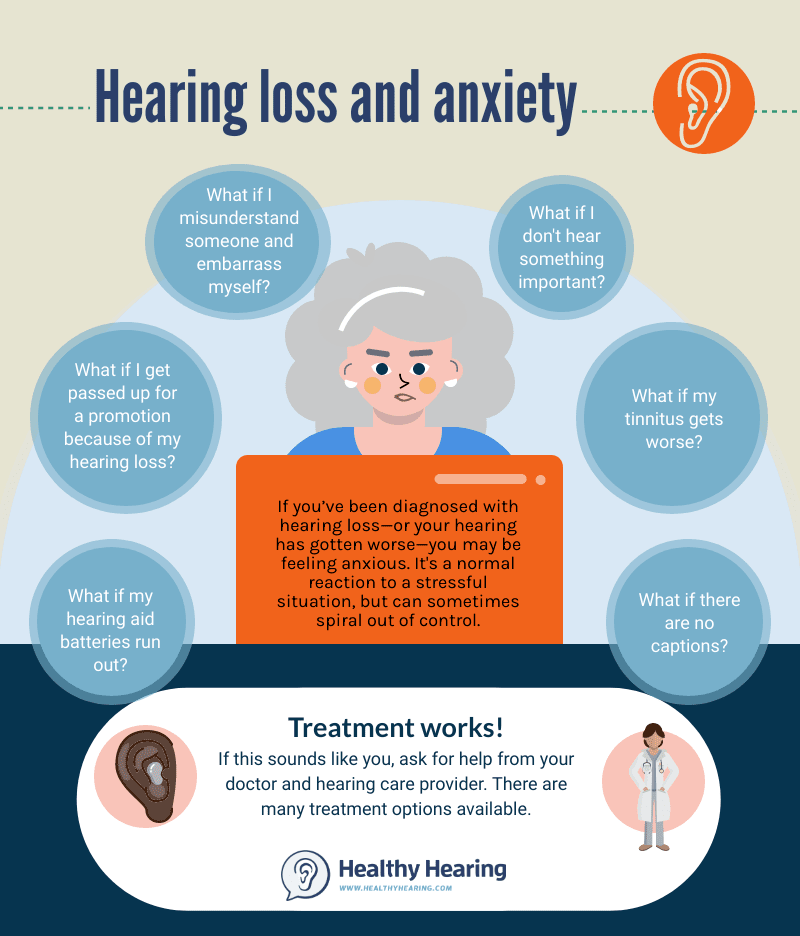|
www.HealthyHearing.com |
Hearing loss and anxiety: What's the connection?
Contributed by Emily Ostrowski, content manager, Healthy Hearing Key points:
Though you might not automatically associate hearing loss with anxiety, the two conditions are interconnected. When you have hearing loss, you may struggle with communication, leading to feelings of isolation, frustration, and increased anxiety in social situations. For some, anxiety may spread beyond hearing loss and lead to a general increase in worry and rumination. In fact, multiple studies1,2 have linked hearing loss with a greater chance of developing anxiety and experiencing psychological stress. Not only that, but research3,4 has also shown that more severe hearing loss is linked to a higher risk of anxiety. Why does hearing loss make you anxious?
conversations can contribute to anxiety. There are several reasons why hearing loss may trigger or exacerbate anxiety. Hearing loss impacts your ability to communicate with others and follow conversations. This might lead to missing important information at work or when socializing. Perhaps you miss signals that someone is about to speak or hasn't finished yet, which could lead to accidentally interrupting them. Or you might miss a joke that everyone else laughs at. These experiences can leave you feeling left out or unsure and lead to increased social anxiety as well as loneliness and depression. Some people with hearing loss also experience uncertainty surrounding their condition, leading to worries about whether or not their hearing will continue to get worse and how that might impact their lives, including careers and relationships with their loved ones. Difficulty hearing can also be disorienting, especially in loud, busy places. This feeling can be exacerbated for people with hearing loss who also experience tinnitus or dizziness, which can be anxiety-inducing symptoms in themselves. Related: Why anxiety often accompanies balance disorders, and what to do about it What does anxiety feel like?In addition to worried thoughts, anxiety can trigger many physical symptoms, including:
You may also have trouble concentrating and experience general feelings of dread. It’s important to see a doctor if you are having these or other physical symptoms to rule out additional causes.
What about tinnitus and anxiety?Anxiety also tends to be higher in people with hearing loss who also experience tinnitus, as the persistent noise can disrupt concentration, worsen sleep, and negatively affect a person’s emotional well-being3. Conversely, anxiety can worsen tinnitus symptoms, creating a cycle where the two conditions exacerbate one another. Treatment options for anxietyIf you are otherwise in good health and these thoughts and physical sensations are becoming intrusive and affecting your quality of life, it may be time to seek professional help from a mental health provider. Anxiety is a common problem. According to the Anxiety and Depression Association of America (ADAA) roughly 19% of adults in the U.S. have an anxiety disorder, yet just slightly over one third of those receive treatment. There are many reasons as to why this discrepancy might exist including, cost of treatment, lack of providers in the area, long wait times, and limited to no insurance coverage for counseling or other psychological services. For example, while Medicare Part B covers individual or group therapy not all providers accept Medicare. According to an article from AARP, analysis found that “60 percent of psychiatrists accept new Medicare patients, compared with almost 90 percent of physicians.” To that end, it can be helpful to use online resources such as Psychology Today or Medicare’s provider website to find a mental health clinician that takes your benefits or offers a sliding scale payment plan. Stigma around mental healthAnother barrier can be the ongoing stigma around mental health issues and embarrassment at the thought of reaching out for help. Though it can be overwhelming, there’s no reason to feel ashamed or embarrassed if you’re experiencing symptoms. Anxiety is treatable and there are numerous options that can help you find relief. Treatment may include medication and cognitive behavioral therapy (CBT), in which you learn how to tame repetitive and negative thoughts. For physical symptoms, tools like exercise and meditation can help. CBT and stress management techniques are also helpful at managing tinnitus for many people, as well. Related: Cognitive reframing techniques for tinnitus sufferers Can hearing aids help your mental health?If your anxiety is triggered, even in part by your hearing loss, treatment with hearing aids may help to reduce your symptoms. Research2 has shown that people with moderate hearing loss who used hearing aids were less likely to report psychological distress than those who didn’t. Additional studies have shown that hearing aids may reduce the risk of depression and improve your overall well being. By making it easier to communicate and stay engaged, hearing aids and other assistive listening devices can reduce the anxiety, frustration and isolation that comes with untreated hearing loss. What if the thought of hearing aids makes you anxious?Anxiety about hearing loss can also extend to using hearing aids. Even though the stigma is fading, some people still worry that wearing hearing aids might make them seem old or less capable. It’s a common concern, but ignoring hearing loss can lead to bigger challenges that can increase anxiety further and make it harder to live independently. Whereas using hearing aids can actually help reduce anxiety and improve your quality of life. Finding help for hearing lossThe connection between anxiety and hearing loss is real, but it’s important to remember that help is available. Taking steps to address your hearing loss can make a profound difference in both your mental and emotional well-being. Visit a local hearing provider to find treatment that can help restore your confidence in social situations and improve communication to let you live a fuller, more connected life. Sources: 1. Bidirectional associations of vision and hearing loss with anxiety: prospective findings from the Three-City Study, 2018 Emily Ostrowski, content manager, Healthy Hearing
|
Featured clinics near me
Earzlink Hearing Care - Reynoldsburg
7668 Slate Ridge Blvd
Reynoldsburg, OH 43068

Find a clinic
We have more hearing clinic reviews than any other site!



 Emily is an experienced journalist and medical content writer based in Maine. Passionate about delivering enlightening and accurate content, she is committed to empowering people to make informed choices regarding their hearing health.
Emily is an experienced journalist and medical content writer based in Maine. Passionate about delivering enlightening and accurate content, she is committed to empowering people to make informed choices regarding their hearing health.